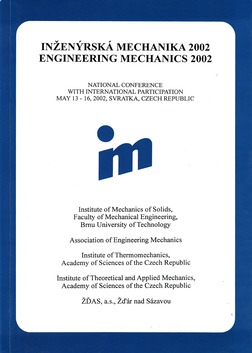Proceedings Vol. 8 (2002)

INŽENÝRSKÁ MECHANIKA 2002
ENGINEERING MECHANICS 2002
May 13 – 16, 2002, Svratka, Czech Republic
Copyright © 2002 Institute of Mechanics of Solids, Faculty of Mechanical Engineering, Bruno University of Technology, Brno
ISSN 1805-8248 (printed)
ISSN 1805-8256 (electronic)
list of papers scientific commitee
pages 111 - +8p., full text
Inelastic macroscopic behavior of technical as well as biological materials is strongly related to their structures. Therefore, constitutive modeling of the respective behavior calls for a description of the influence of structural properties. There are two difficult problems characteristic for this approach: (i) It is not sufficient to count only on the average values of stresses and strains in the material constituents. It can be shown that in many important cases the elastic energy of fluctuations of stresses surmounts by order the energy calculated from these average values only. (ii) In many cases of inelastic deformation it is necessary to take into account the changes in the structure, which is not easy to describe. In the author's mesomechanical concept, the effect offluctuations is taken into account by special tensorial internal variables, the changes of state of the material are described by changes of internal mesoscopic stresses and of structural parameters. The last-named changes of structural parameters specifY the changes in the structure. There are many attempts to bypass this problem of structural analysis by using the second law of thermodynamics as a basis for the creation of the respective constitutive equations. Traditionally, phenomenological thermodynamics has been successfully applied in the problems of gases and liquids, but applications to mechanics of solids, specifically in formulations of constitutive equations, meet serious problems. The essential difference between fluids and solids consists in the fact that in solids, a significant amount of mechanical energy can be stored on different structural scales, which makes application of thermodynamics very difficult. It is shown that the proposed mesomechanical approach leads to results that closely describe the observed behavior of inelastic deformation of many complex heterogeneous materials, that it is simple and general, and the material parameters can relatively easily be determined. It can serve as a basis for a FEM analysis of bodies composed of materials with complicated mechanical and thermomechanical properties.
back to list of papers
Text and facts may be copied and used freely, but credit should be given to these Proceedings.
All papers were reviewed by members of the scientific committee.

 Powered by
Imce 3.20 © 2023, Pavel Formánek, Institute of Thermomechanics AS CR, v.v.i. [generated: 0.0121s]
Powered by
Imce 3.20 © 2023, Pavel Formánek, Institute of Thermomechanics AS CR, v.v.i. [generated: 0.0121s]